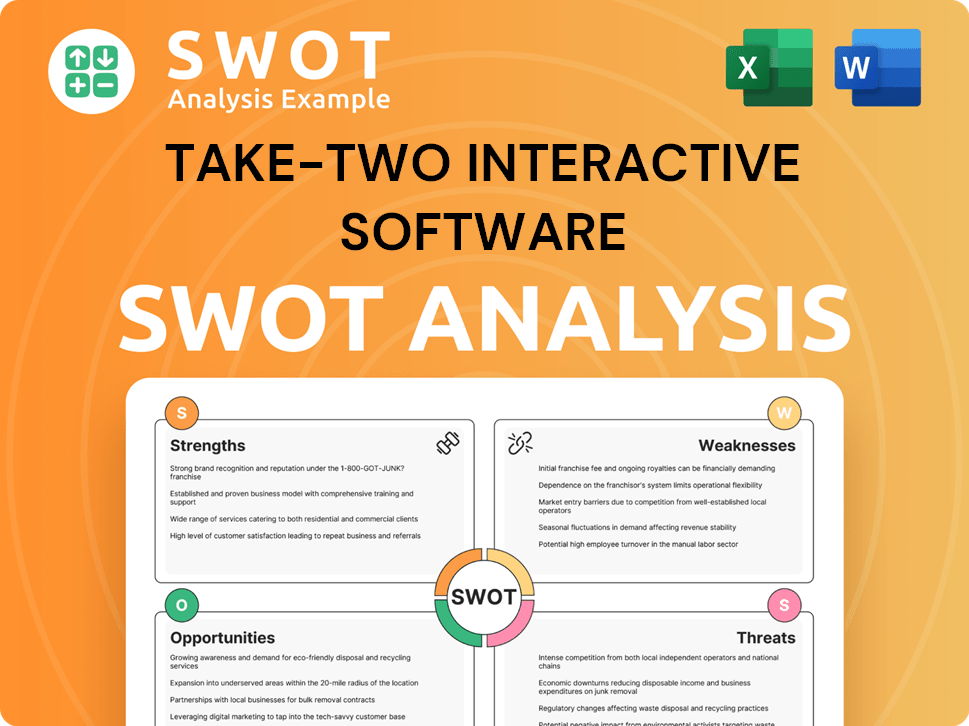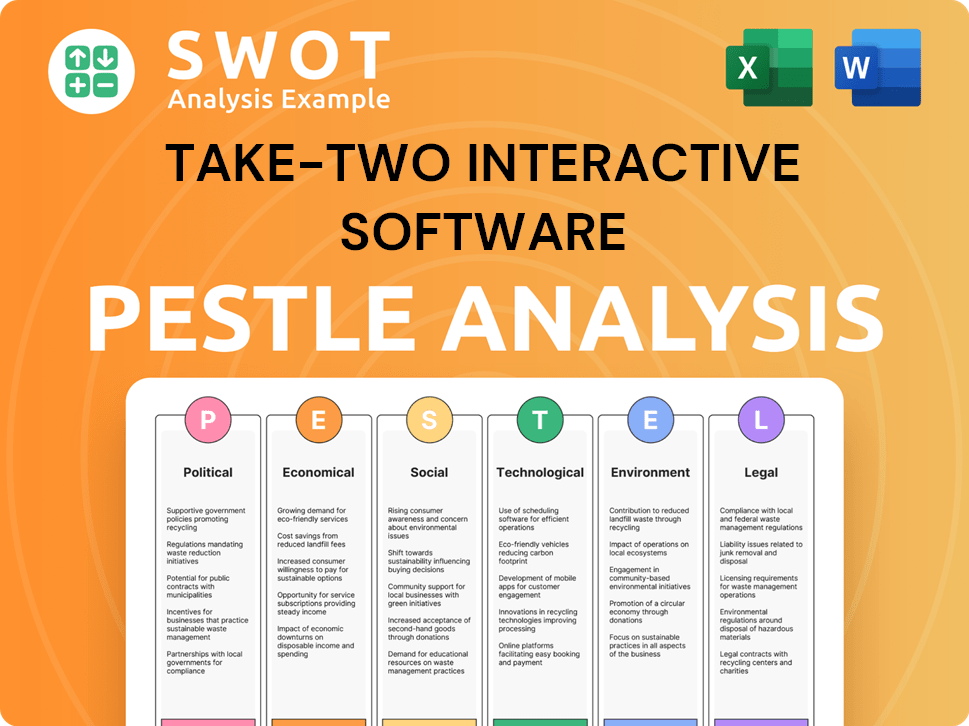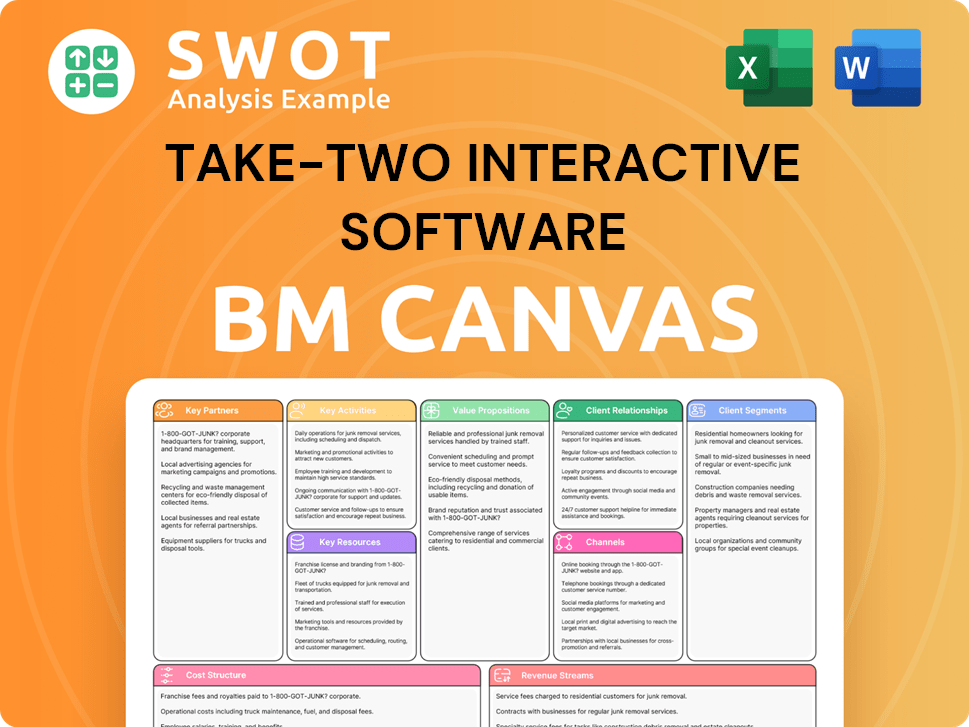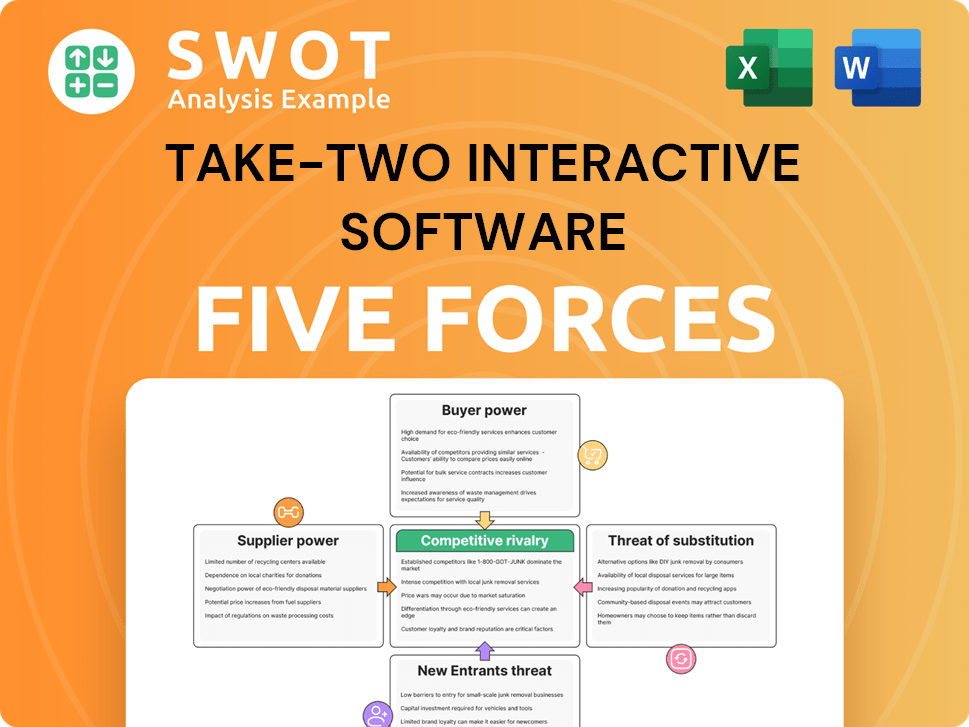Take-Two Interactive Software Bundle
How Did Take-Two Interactive Conquer the Gaming World?
Take-Two Interactive Software, Inc. is a titan in the video game industry, known for blockbuster franchises that have captivated millions. From its humble beginnings in 1993, the company has evolved into a global entertainment powerhouse. The story of Take-Two is a tale of strategic acquisitions, innovative game development, and a relentless pursuit of market dominance.

This journey includes the pivotal acquisition of Rockstar Games, which significantly shaped its trajectory. Today, Take-Two Interactive is a leading Take-Two Interactive Software SWOT Analysis with a diverse portfolio, including Rockstar Games and 2K Games, solidifying its position in the video game company landscape. Exploring Take-Two Interactive's history reveals the key decisions that fueled its growth and its impact on the video game industry, including its biggest games.
What is the Take-Two Interactive Software Founding Story?
The founding story of Take-Two Interactive Software is a tale of entrepreneurial vision in the early days of the video game industry. Founded by Ryan Brant on September 30, 1993, the company emerged to capitalize on the growing popularity of console and PC gaming. Take-Two's initial focus was on developing and publishing interactive entertainment, aiming to create high-quality titles that would resonate with a burgeoning audience.
Brant, with his business background, saw the potential of the video game market and established Take-Two with the goal of producing engaging games. The company's early business model included both developing its own games and distributing titles from other smaller developers. 'Rippin' Riders' for the PlayStation, released in 1999, was one of its earliest products. Take-Two's journey began with Brant's personal resources and early investments, reflecting the typical startup phase.
The name 'Take-Two' was chosen to represent a 'second take,' or a fresh opportunity in the entertainment industry. The founding team, though small, brought together expertise in game development, marketing, and business management. The 1990s, with rapid technological advancements and increasing consumer adoption of video game consoles, provided a fertile ground for Take-Two's inception. Learn more about the Competitors Landscape of Take-Two Interactive Software.
Take-Two Interactive's founding marked a pivotal moment in the video game industry, setting the stage for its future success.
- Founding Date: September 30, 1993.
- Founder: Ryan Brant.
- Initial Focus: Developing and publishing interactive entertainment for consoles and PC.
- Early Business Model: Developing and publishing its own games, as well as distributing titles from other smaller developers.
- First Product: 'Rippin' Riders' (1999).
Take-Two Interactive Software SWOT Analysis
- Complete SWOT Breakdown
- Fully Customizable
- Editable in Excel & Word
- Professional Formatting
- Investor-Ready Format

What Drove the Early Growth of Take-Two Interactive Software?
The early growth of Take-Two Interactive was marked by strategic acquisitions and a growing portfolio of game titles. This period established the company within the competitive video game market. Key acquisitions and public offerings fueled its expansion. These moves were crucial in shaping the future of the Take-Two Interactive Software.
In 1997, Take-Two Interactive acquired GameTek, Inc. This acquisition provided the company with a catalog of existing games and development talent. This was an early move in Take-Two's strategy to expand its game offerings and development capabilities. This acquisition helped Take-Two to establish a stronger presence in the video game industry.
The acquisition of BMG Interactive in 1998 was a pivotal moment for Take-Two Interactive. This acquisition included the rights to the Grand Theft Auto series. This acquisition led to the formation of Rockstar Games, which became a key part of Take-Two's success. This move significantly boosted Take-Two's portfolio.
Take-Two expanded its game offerings across multiple platforms, including PC, PlayStation, and Nintendo 64. Early game releases included titles like 'Smuggler's Run' and 'Midnight Club'. This expansion helped Take-Two to reach a broader audience. This strategy was crucial for the company's early growth.
Take-Two went public on the NASDAQ stock exchange in 1997. This capital raise supported acquisitions and development efforts. Leadership transitions also played a role, with key executives managing the growing operations. These moves helped to establish Take-Two as a major player in the
Take-Two Interactive Software PESTLE Analysis
- Covers All 6 PESTLE Categories
- No Research Needed – Save Hours of Work
- Built by Experts, Trusted by Consultants
- Instant Download, Ready to Use
- 100% Editable, Fully Customizable

What are the key Milestones in Take-Two Interactive Software history?
The Take-Two Interactive Software company timeline includes several key milestones that have shaped its trajectory in the video game industry. The launch of Grand Theft Auto III in 2001 was a pivotal moment, while the establishment of 2K in 2005 expanded its portfolio. The acquisition of Zynga in 2022 further broadened its market presence.
| Year | Milestone |
|---|---|
| 2001 | Grand Theft Auto III was launched, revolutionizing open-world gaming. |
| 2005 | 2K was established, bringing sports franchises and acclaimed titles under the Take-Two umbrella. |
| 2022 | The acquisition of Zynga marked a significant expansion into the mobile gaming market. |
Innovations have been central to Take-Two Interactive's success, particularly through the development of groundbreaking games by Rockstar Games. The company's strategic acquisitions, like that of Zynga, represent further innovation by expanding its reach and diversifying revenue streams.
The launch of Grand Theft Auto III in 2001 set new standards for open-world games, influencing the industry's narrative and gameplay.
The creation of 2K in 2005 brought popular sports franchises and critically acclaimed titles under Take-Two's umbrella.
The NBA 2K franchise, a key part of 2K, generated over $2 billion in net bookings in fiscal year 2024.
The acquisition of Zynga in May 2022 for $12.7 billion expanded Take-Two's presence in the mobile gaming market.
Take-Two has focused on recurring consumer spending, which accounted for 79% of total net bookings in fiscal year 2024.
Grand Theft Auto V has sold over 195 million copies worldwide as of November 2024, demonstrating sustained success.
Despite its achievements, Take-Two Interactive has faced various challenges, including legal issues and market competition. The company has also had to adapt to the changing landscape of game development and distribution.
Take-Two has faced legal challenges related to the content in some of its games.
The video game company has navigated intense competition from other major publishers.
Product failures have occurred, prompting internal restructuring and a focus on quality control.
The company has adapted to digital downloads and subscription models in game distribution.
Mobile gaming contributed 30% of Take-Two's total net bookings in fiscal year 2024, highlighting the shift in focus.
Take-Two has made strategic adjustments to address market downturns, focusing on recurring consumer spending.
Take-Two Interactive Software Business Model Canvas
- Complete 9-Block Business Model Canvas
- Effortlessly Communicate Your Business Strategy
- Investor-Ready BMC Format
- 100% Editable and Customizable
- Clear and Structured Layout

What is the Timeline of Key Events for Take-Two Interactive Software?
The journey of Take-Two Interactive Software, a prominent video game company, has been marked by significant milestones, strategic acquisitions, and the release of blockbuster titles. From its inception in 1993 to its expansion into mobile gaming and the anticipation surrounding its upcoming releases, Take-Two's history reflects its evolution and commitment to the interactive entertainment industry.
| Year | Key Event |
|---|---|
| 1993 | Ryan Brant founded Take-Two Interactive Software, Inc., marking the beginning of the video game company's journey. |
| 1997 | Take-Two went public on the NASDAQ stock exchange, a significant step in its corporate development. |
| 1998 | The acquisition of BMG Interactive led to the formation of Rockstar Games, which would become a key part of Take-Two's success and the creation of the Grand Theft Auto franchise. |
| 2001 | Grand Theft Auto III was released, revolutionizing open-world gaming and solidifying Rockstar Games' influence. |
| 2005 | Take-Two established 2K, a publishing label that expanded its portfolio to include various genres, including sports and action games. |
| 2007 | BioShock, a critically acclaimed title, was released under the 2K label, demonstrating Take-Two's commitment to high-quality games. |
| 2013 | Grand Theft Auto V launched, becoming one of the best-selling video games of all time and a major financial success. |
| 2018 | Private Division was established as a publishing label focused on independent developers, showcasing Take-Two's support for diverse games. |
| 2022 | The acquisition of Zynga was completed, significantly expanding Take-Two's presence in the mobile gaming market. |
| 2024 | Take-Two reported strong financial results for Fiscal Year 2024, with net bookings of $5.3 billion, reflecting its financial health. |
| 2025 | Take-Two continues development on highly anticipated titles, including the next installment in the Grand Theft Auto series, promising future growth. |
Take-Two Interactive is focused on expanding its mobile gaming presence, particularly through Zynga. This strategic move aims to capitalize on the growing mobile gaming market. The integration of Zynga is expected to contribute significantly to the company's overall revenue and market share in the coming years.
The company plans to leverage its extensive portfolio of intellectual properties to create new experiences. This includes exploring new genres, platforms, and business models. This strategy is designed to diversify revenue streams and engage a broader audience.
Take-Two is exploring emerging technologies like cloud gaming and virtual reality. These technologies could open up new opportunities for game distribution and player engagement. Investments in these areas could position the company at the forefront of industry innovation.
The highly anticipated release of Grand Theft Auto VI is expected to be a major catalyst for revenue growth. Analyst predictions suggest a significant positive impact on the company's financial performance. This release is crucial for Take-Two's future success.
Take-Two Interactive Software Porter's Five Forces Analysis
- Covers All 5 Competitive Forces in Detail
- Structured for Consultants, Students, and Founders
- 100% Editable in Microsoft Word & Excel
- Instant Digital Download – Use Immediately
- Compatible with Mac & PC – Fully Unlocked

Related Blogs
- What is Competitive Landscape of Take-Two Interactive Software Company?
- What is Growth Strategy and Future Prospects of Take-Two Interactive Software Company?
- How Does Take-Two Interactive Software Company Work?
- What is Sales and Marketing Strategy of Take-Two Interactive Software Company?
- What is Brief History of Take-Two Interactive Software Company?
- Who Owns Take-Two Interactive Software Company?
- What is Customer Demographics and Target Market of Take-Two Interactive Software Company?
Disclaimer
All information, articles, and product details provided on this website are for general informational and educational purposes only. We do not claim any ownership over, nor do we intend to infringe upon, any trademarks, copyrights, logos, brand names, or other intellectual property mentioned or depicted on this site. Such intellectual property remains the property of its respective owners, and any references here are made solely for identification or informational purposes, without implying any affiliation, endorsement, or partnership.
We make no representations or warranties, express or implied, regarding the accuracy, completeness, or suitability of any content or products presented. Nothing on this website should be construed as legal, tax, investment, financial, medical, or other professional advice. In addition, no part of this site—including articles or product references—constitutes a solicitation, recommendation, endorsement, advertisement, or offer to buy or sell any securities, franchises, or other financial instruments, particularly in jurisdictions where such activity would be unlawful.
All content is of a general nature and may not address the specific circumstances of any individual or entity. It is not a substitute for professional advice or services. Any actions you take based on the information provided here are strictly at your own risk. You accept full responsibility for any decisions or outcomes arising from your use of this website and agree to release us from any liability in connection with your use of, or reliance upon, the content or products found herein.